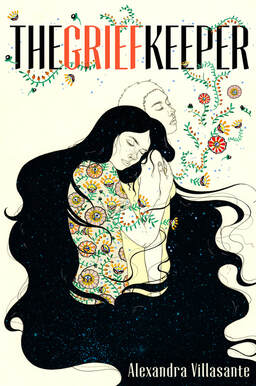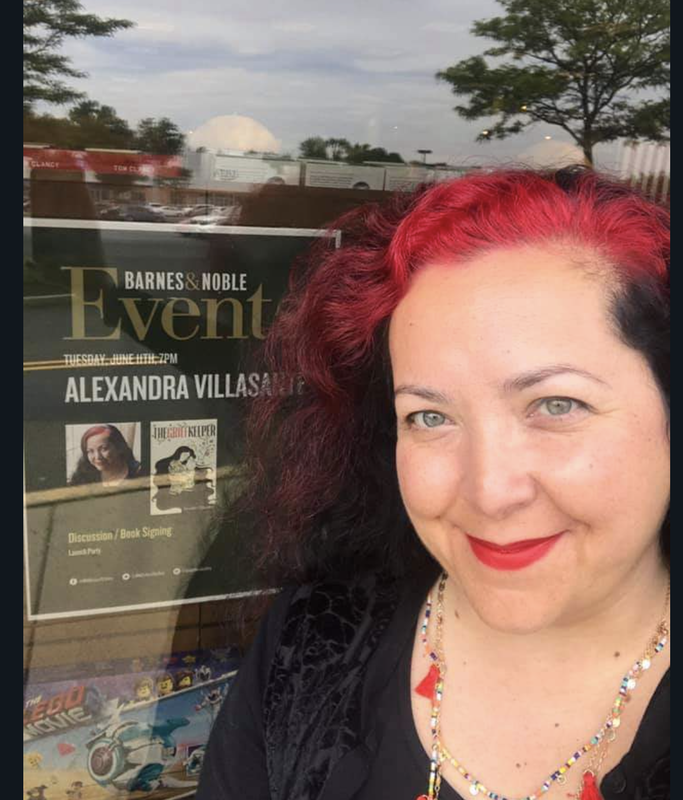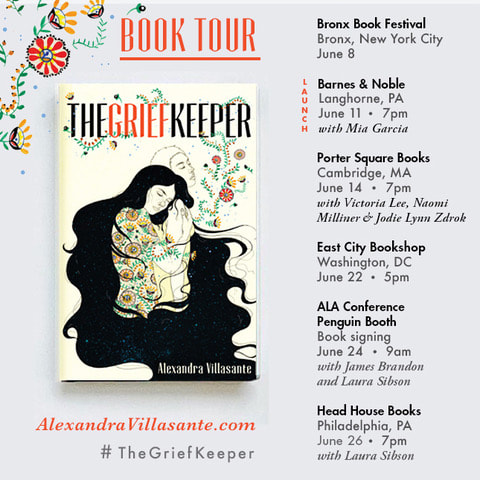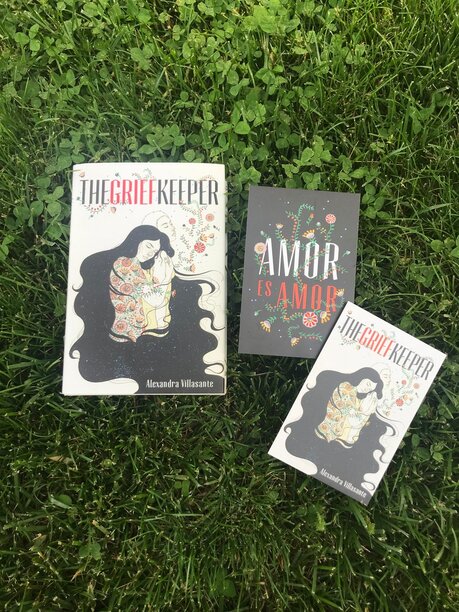In conversation with fellow Musa, Sara FaringIt’s my pleasure today to introduce Las Musas blog readers to Alex Villasante, the brilliant author of one of my favorite YA novels of 2019—The Grief Keeper. The Grief Keeper is the tender, moving, and compulsively readable speculative tale of seventeen-year-old Marisol, a young Salvadoran who flees her country with her little sister after their brother is murdered. Marisol is offered a chance at asylum in the U.S. if she agrees to participate in a dangerous experimental trial: she must take another’s grief into her body. A Junior Library Guild selection, an Indies Introduce pick, and a Barnes & Noble debut of the week, THE GRIEF KEEPER has been called an “engrossing debut” by Publishers Weekly and a story that “will grip readers and provoke empathy” by Kirkus Reviews. Alex, thank you for speaking with me. Without further ado... What was the very first seed of THE GRIEF KEEPER? Was it a question you needed answered, an image that wouldn't leave you, a character whispering in your head, or something else entirely? The idea for THE GRIEF KEEPER came from two trains of thought I’d been mulling over – my parent’s immigration story, their experiences and sacrifices; and an article about a wearable device being tested that might alleviate the symptoms of PTSD in soldiers returning from war. These thoughts knocked around my head until they collided with a ‘What if?’ What if there was a way to take grief from one person and give it to another? Which begged another question: Who would be the giver and who would be the receiver? I followed this string of questions until I had Marisol firmly in my head. Then I followed Marisol to the rest of her story. What fell out of the overstuffed closet in your brain (we all have one) that you knew you needed to include in this story? Did you come across any fascinating details while working on the book that you ultimately chose to exclude? Oh, my overstuffed brain! I’m always adding details and characters and scenes that tumble out of my head in the first draft. Most of those superfluous ideas, I manage to weed out (back into that brain-space you go! Eight ghost brothers bent on revenge maybe needed for another book!) but there was another pair of siblings in this book – an adult brother and sister working through their own, very different, reasons for grief. My editor wisely saw that this pair did not add anything to the narrative, and worse, took tension away. OFF they went! The sisters in this book shine so bright from the very first pages. What did you want to highlight in Marisol and Gabi's sisterly dynamic? Siblings is a theme I come to again and again in my writing. There isn’t another person who will be closer to you in your life. Even if you hate your brother or sister – that bond of emotion is close and complicated. As I discovered who Marisol was, I wrote Gabi and their older brother Pablo, defining each sibling as they were in relation to each other. That’s how siblings grow, in shadows of others, in protection or competition, hatred or love or both. I wanted Marisol and Gabi’s relationship to be a centerpiece of the book because that is what motivates Marisol in the hard choices she makes. What books, movies, and television shows do you like to think THE GRIEF KEEPER is in conversation with? THE GRIEF KEEPER is an immigrant story, in the way YOU BRING THE DISTANT NEAR and AMERICAN STREET are immigrant stories – though these are very different. Exploring what it means to be other, what it means to feel apart, is at the core of my book. Also, as you and I have discussed, I’d say that NEVER LET ME GO by Kazuo Ishigurois a book I think about a lot in context with THE GRIEF KEEPER. (I love that book, it haunts me still. I am not putting my book on a par with that masterpiece, let’s be clear!) Like NEVER LET ME GO, THE GRIEF KEEPER explores what it means to be human, how we disregard humanity to the point of dehumanization for the sake of progress. It also questions who gets to benefit from technology and who suffers. In the book, you beautifully and sensitively explore the way that this process of passing grief from one individual to another could be used to help the privileged and hurt the needy. As a reader, it's impossible not to empathize with GK's protagonist, Marisol, a young Salvadoran who seeks asylum in the US and is given a chance at that for herself and her sister if she agrees to participate in this very risky experiment. Detailing how this experiment affects the lives of teenagers is a visceral, intimate way of examining inequity in the world. What parallels did you hope to draw between Marisol's world and ours? I see Marisol’s world and ours as essentially the same. The only difference is the technology. The forces that seek to make us despise otherness are here right now. The moral ambiguity that comes with having power, money and privilege is here too. Even the drive to protect the ones we love at any cost is here. We’re living in Marisol’s world. THE GRIEF KEEPER takes existing situations and turns them up a notch. While working on the book, did you imagine a world in which the experiment was rolled out on a wider scale--where grief was eradicated in a privileged few? What did that society look like? What kind of role do you think grief plays in shaping who we are?
Oh God, I did think about that. I had, at one time, a more grandiose vision of this book as a sci-fi fantasy dystopian. Evil corporations, rebellious teens, conspiracy and murder plots (sidebar: I’d totally read this book if anyone wants to write it!) But ultimately, I decided I wanted to explore the personal effects of grief and sacrifice. I wanted to dig deep into the emotion and the connection and the consequences. I needed less plot twists for that and more hands reaching to touch each other. While reading THE GRIEF KEEPER, I was so moved by Marisol's fierce protectiveness of her sister, Gabi--and by her desire to preserve Gabi's innocence. How would THE GRIEF KEEPER differ if it was narrated by Gabi? Would you ever consider writing a MG version from her point of view (I'm only asking because I'm desperate to read it)? I love Gabi. She’s the character I didn’t know I’d love so much until her voice started singing out to me on the page. I think a book told from Gabi’s perspective would be lighter and more buoyant, because Gabi has the privilege many younger siblings have; they know they have someone who always has their back. Fair or not, that means they get to be more carefree. Gabi is also quite different in her personality. She looks for beauty. She likes speed and breezes in her hair and she likes loud. She’s much more of an extrovert than Marisol. While working on the book, did you learn anything surprising about yourself that you might like to share? That I could write a hard book. I had this idea initially in late 2015 and I submitted it to my agent, Barbara Poelle along with other book ideas that were less hard. THE GRIEF KEEPER became the fourth book I went on submission with Barbara, and the books before were good, interesting and all within what I thought of as ‘my wheelhouse.’ THE GRIEF KEEPER was decidedly outside of my comfort zone – so much research, so much heavy exploration of feelings. So many stories that had to be gotten right. I wasn’t sure I could do it. I not-so-secretly hoped that Barbara would choose one of my other ideas that were lighter and fluffier. No such luck. She told me (and other friends echoed her words) to write the hard book. I didn’t think I could. But I found out I was wrong! What do you hope readers will take away from reading THE GRIEF KEEPER? Everyone deserves love. It sounds so easy and most people would agree immediately with this statement. But when you actively apply it to people who are different from you; who look different or speak differently or love differently – that’s when it becomes harder. Believe that this is true and act accordingly. Everyone deserves love. What's next for you, Alex? Sleep? Ha ha. No. I’m going on tour with the Grief Keeper [Sara, want to include the graphic of where I’ll be in the blog post? I’ll attach it here] and I’m looking forward to talking to readers and gushing about all the AMAZING Las Musas books out in the world. There’s a spooky South American tale called THE TENTH GIRL that I cannot wait to get my hands on (seriously, where is my copy??) and I’m about to get edits on my second book any day now – though I can only share that my next book contains another strong, but unusual sibling story, a trip to the Hindenburg crash site and going to summer school for failing Religion. Sara, thank you so much for these thought-provoking questions- I had a blast!
0 Comments
Leave a Reply. |
Las Musas SpeakWelcome to our blog! Archives
July 2024
Categories
All
|





 RSS Feed
RSS Feed